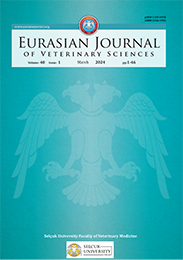| 2004, Cilt 20, Sayı 2, Sayfa(lar) 087-093 |
| [ Türkçe Özet ] [ PDF ] [ Benzer Makaleler ] |
| The Effects of Manufacturing and Ripening Periods of Herby Cheeses on Growth of Listeria monocytogenes |
| Hisamettin Durmaz1, Emrullah Sağun2 |
| 1Harran Üniversitesi Veteriner Fakültesi, Besin Hijyeni ve Teknolojisi Anabilim Dalı, ŞANLIURFA 2Yüzüncü Yıl Üniversitesi Veteriner Fakültesi, Besin Hijyeni ve Teknolojisi Anabilim Dalı, VAN |
| Keywords: Listeria monocytogenes 4ab, Ripening Period, Herby Cheese |
| Downloaded:1653 - Viewed: 2427 |
|
In this study, the surviving ability of Listeria monocytogenes was examined during the manufacturing and ripening of herby cheese. For this purpose, L. monocytogenes (strain 4ab) at the levels of 102, 103, 104 and 105/ml was inoculated into the raw milk and then herby cheese made according to the two different methods. The cheeses were either dry-salted or brined and stored either in the soil or at refrigerator for 90 days. The surviving ability of L monocytogenes and the changes of total aerobic bacteria and pH were examined during ripening of cheeses. L monocytogenes survived with a different population both in the traditional and brine herby cheese for 60 days, but it was not isolated after 90 days of ripening. The mean numbers of total aerobic bacteria decreased both in the cheese groups during ripening, but they were found lower in the traditional method than those of the brine method. The pH values of herby cheeses decreased until the 60th day of ripening, but then they increased on the 90th day. Consequently, the results indicated that L. monocytogenes might survive in herby cheeses made from raw milk at least 60 days; therefore, if the herby cheeses contaminated with L. monocytogenes are consumed freshly or un-ripened, they can cause public health problem.
|
| [ Türkçe Özet ] [ PDF ] [ Benzer Makaleler ] |




